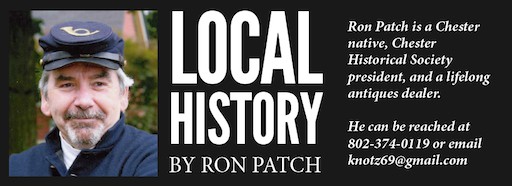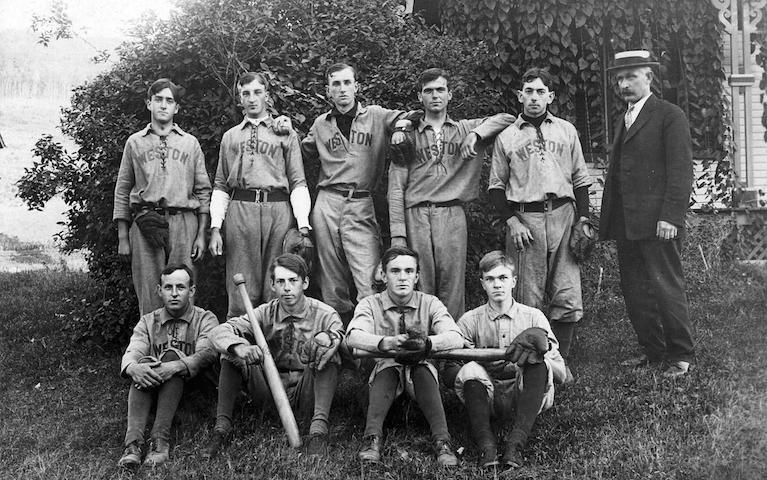
Earlier this year, Ed Peck told me his son Pete wanted to listen to cassette tapes of an interview Gale Peck done in the 1980s for the Chester Historical Society. I wasn’t aware of the tapes so I disguised my ignorance by saying, “I’ll let you know.” As we are archiving our collections, I’ve kept these tapes in mind.
Last week I found them. There were three tapes. Only one had any information written on it: “Gale Peck 1986.” I asked Tom Hildreth if he would convert the tapes to CDs, which he did. I spent time over the weekend listening to the Peck interviews.

Two of the interviews the audio is pretty good. The others the microphone was too far away. Numerous disruptions, over talking or laughter, make them hard to cypher. I recognized Gale’s voice. It was strange hearing his voice again. I also recognized Martha Bessey’s voice.
There were two or three other older area residents interviewed at this time. One man’s name was Richardson. He lived on Summer Street in Springfield I think. His father was a high-end horse trainer in Springfield. His recording, while noisy, is an excellent record of Springfield history.
This was a difficult process for me. I can’t type so I listen for 10 seconds, pause the audio, and quickly type the 10 seconds into a word document. This I had to repeat many times. Below are a couple transcriptions you might find interesting.
Gale’s interview was done with a young lady. Her first question was, “What’s your name?” Answer: “Gale Peck.” Next question: “When were your born?” Answer: “1887.” Question: “Where were you born?” Answer: “Weston, Vermont.”
The interview quickly becomes interesting. Gale says there were nine kids in his family, six boys and three girls. He describes living on the farm until he was 13, when his family moved off the farm to run a grocery store in Weston village.
Gale describes the store as two and a half stories. His father Philetus paid $275 for the property. Gale also mentions his parents owned the farm where Gale lived until he was 13. This farm was 160 acres. His parents owned another farm, also 160 acres, for a total of 320 acres. Gale mentions Philetus sold “the whole kit and caboodle for $1,000.”
Gale describes district schools and the village school. At 13, Gale was driving the horse-drawn delivery wagon, delivering groceries around town. Ed Peck, Gale’s grandson, told me Gale also delivered groceries to loggers working in the National Forest.
They didn’t have electricity or bathrooms in those days. Gale tells how he made a basketball from a cow’s bladder his father had slaughtered.
Gale describes his days with the Weston Cornet Band. “I played the clarinet. We didn’t have any clarinets in the band at the time. I ended up being the leader of the band. I bought two clarinets of Frank Lovejoy. He played tenor in the band there. His oldest son Robert afterwards worked for the Lovejoy Tool Company over in Springfield. He played the clarinet too. I played B flat. I think there were about 20 in the band then.”
Question: “Did you travel around?”
Gale: “On the Fourth of July we’d go somewhere to play. One year we went to South Londonderry playing in the morning. Then we went from there up to Lowell Lake to play in the afternoon. And then in the evening back to Weston to play in the bandstand and give a concert there.” The interviewer giggles.
Gale describes the reservoir in Weston now called the Trout Club. “That was built by people who wanted to use the water power for mills. Below the reservoir about a half-mile was a shingle mill. Then down in the village there was at least a half-dozen mills running off the brook. There was a chair stock factory and a tannery where they tanned hides. And there was a grist mill and a butter print factory.”
He mentions learning to drive a Model-T. He soon bought one for a taxi. The new Model-T chassis cost him $425. He then bought a jitney body for a taxi. Gale moved to Chester in 1915.
Gale lived to 104. His son Howard lived to 103. Does anyone know who the young interviewer was or have memories of this program?
This week’s old saying my mother used. When she was telling you something and forgot what she was going to say, she’d say, “Well, it must have been a lie.”